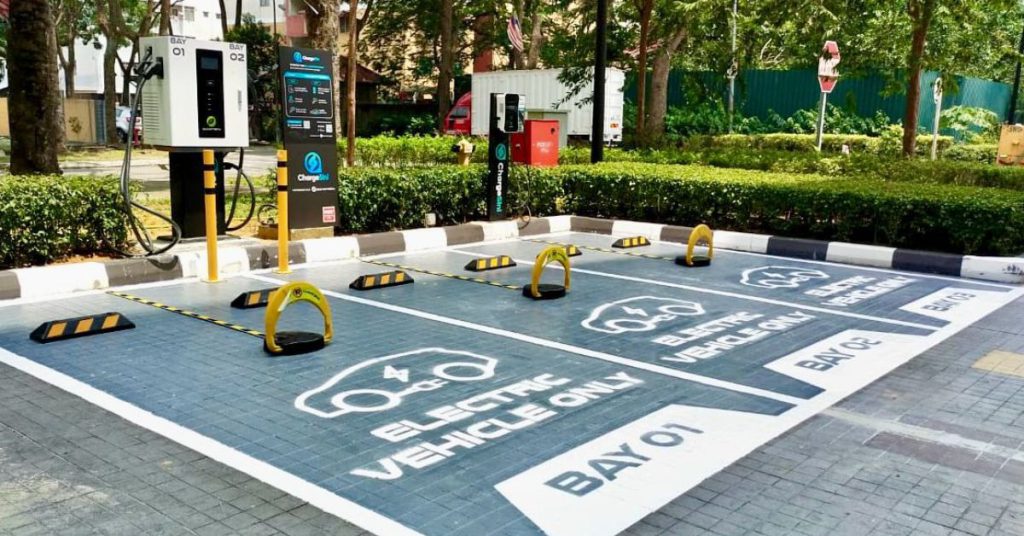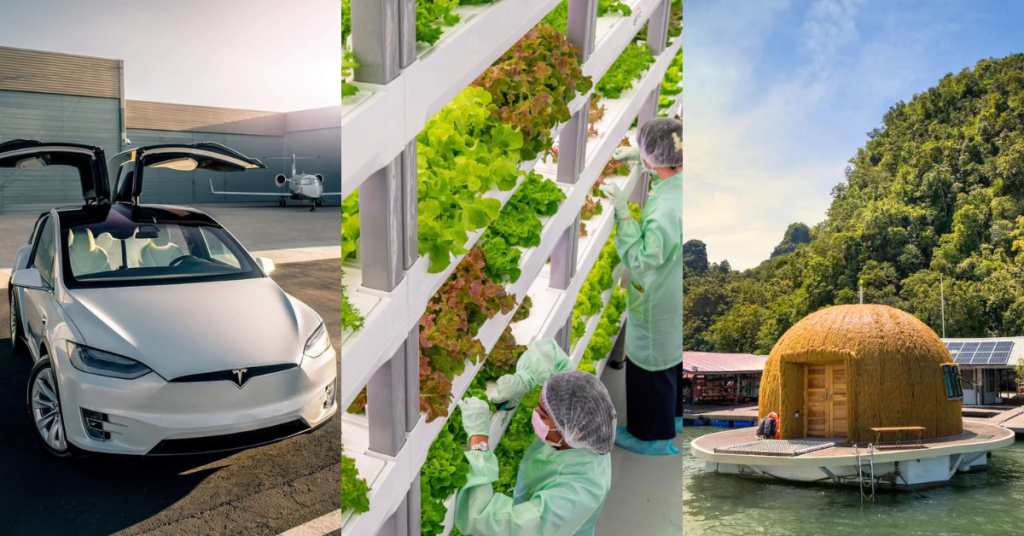As we usher in the new year, there’s one familiar ritual awaiting us. It’s that time of the year again to unveil our predictions for the future. Or to be specific, for 2024.
So, here are 9 of our business and industry trend forecasts that we anticipate will happen next year.
1. Adoption rates of electric vehicles will see a significant jump

If there’s one thing that’s obvious in 2023, it’s the growing interest in electric vehicles (EV) by the automotive industry and the public. Even our homegrown brand Proton Holdings Bhd revealed a draft version of its roadmap for going green that included hybrid, plug-in hybrid EVs, and full battery EVs.
However, according to a report by TNGlobal, the country’s EV sales for the first nine months of 2023 only accounted for 1% of the total industry volume.
But that could change next year. Tesla’s regional headquarters and service facility being set up in Malaysia could potentially boost adoption rates.
The tabled Budget 2024 also introduced a number of measures that are expected to boost the local EV industry, such as allocating RM600 million for Prasarana to acquire 150 electric buses and construct three bus depots.
With those in mind, there will definitely be more EVs cruising down Malaysian roads. And in line with that, more startups will jump on the bandwagon, thereby growing the local EV industry as well.
2. More Malaysian businesses will IPO on Bursa Malaysia than abroad

This past year, we’ve covered a number of funding and acquisition news about local startups. And one thing we’ve repeatedly heard from some of them is the desire to launch an initial public offering (IPO) in the near future.
This includes names like Agroz from the agritech industry, Pet World International Sdn Bhd from the pet food industry, Eatcosys from the foodtech industry, and BIG Pharmacy from the healthcare industry.
While some have expressed interest in launching their IPOs abroad, it’s possible that they might reconsider and list on Bursa Malaysia instead.
This is because based on Budget 2024, it was announced that the government has considered targeted exemptions on Capital Gains Tax (CGT) impositions on activities relating to approved IPOs and Venture Capital.
Simply put, this means that companies who get Bursa Malaysia’s approval to IPO could be relieved from CGT, which is a tax on the profit made from selling assets like shares. This might just be a strong enough incentive to sway those on the fence.
3. More sophisticated elderly care startups will be launched across Malaysia

If you haven’t noticed, over the past decade (2012-2022), Malaysia has witnessed an increase in the elderly population, AKA those aged 65 and above. It’s not surprising as our population is gradually ageing with global life expectancy rates increasing.
And this trend seems to be continuing.
As of last year, the number of elderly citizens is about 2.54 million which makes up about 7.2% of the country’s population. Fast forward to July 2023 and the Department of Statistics Malaysia projected that it will increase to 7.4% this year.
In that light, the elderly care market is expanding to keep up with the trends. This year alone, some local brands have already taken steps to stay ahead of the game.
For example, Sunway Healthcare Group unveiled its flagship senior living residence called Sunway Sanctuary in June. Prior to that, property developer IGB Bhd and Meaningfull Life Sdn Bhd launched ReU Living, an assisted care facility in KL.
Even local babysitting platform Kiddocare bagged a seven-figure funding to expand its niche in order to include aged care services. So, we expect to see more growth in the elderly care sector next year.
4. International tourism will fuel more unique stays and experiences

If you’ve been keeping up with social media the past year, you’ll have noticed that new theme parks and unique accommodations have been dominating the lifestyle space.
For example, new stays and activities just popped into the scene this year, such as:
- Coconest, a floating coconut-shaped stay in Langkawi
- Bomb Battle, a digital interactive gaming experience that combines the escape room concept and paint “bombs”
- REXPERIENCE, an immersive digital art gallery in the former cinema hall of REXKL
- Samadhi Retreat’s Chef’s Table, a private slow dining experience
It isn’t surprising when you consider that everyone has been holed up at home for quite some time due to the pandemic lockdowns. With it fully lifted and international borders opened, more people are looking to having new experiences and making new memories.
In July this year, Tourism Malaysia’s Director General, Datuk Dr Ammar Abd Ghapar, told The Star that international arrivals reached 80% of pre-pandemic levels.
And this was only in the first quarter of 2023. So we can definitely expect to see more international travellers visiting the country.
Hence, you will find more local businesses tapping into unique stays and experiences to meet the demands of tourists.
5. Social enterprises will get a boost in support & growth

Back in June, it was announced that the Small Medium Enterprise Development Bank Malaysia Berhad (SME Bank) aims to increase the number of registered social enterprises in Malaysia from 414 to 5,000 by 2025.
It’s a huge leap to be accomplished in just two years’ time.
But during Startup Week Malaysia 2023, we found out from the president of the Chamber of Social Entrepreneur Development that the country’s bigger plan is to have 10,000 social enterprises by 2030.
One way of accomplishing that is by introducing a new accreditation level next year called “Aspiring SE”.
For this tier, the business does not need to be SSM-registered. It just needs to earn at least 10% revenue from business transactions, and only needs to channel 10% of their profits to beneficiaries.
Hence, with lowered entry criteria coming into place, more founders might be incentivised to enter the space.
Something that’s also becoming increasingly relevant is the awareness around ESG (environmental, social, and governance). There are no formal guidelines for it yet, but we’re hopeful that 2024 will see a more structured approach to practising ESG.
6. All five of Malaysia’s digital banks will be operational

Recently, Grab launched its digital banking system called GXBank, making it the nation’s first digital bank available for use.
Based on its website, the digital bank will be releasing its physical and virtual debit card in January, where users would be able to get unlimited 1% cashback. So it seems to be a service that’s here to stay for the foreseeable future.
For context, digital banks involve the digitalisation of all traditional banking products and processes. This means that there are no physical brick-and-mortar branches to visit.
GXBank is one of five consortiums that gained a digital banking licence from Bank Negara Malaysia back in April 2022, and now that it’s kicked off its service, it’s very likely that the others will want to catch up soon.
For better or worse, this will take us one step further toward being a cashless society. Both merchants and customers will need to adapt accordingly for ease of transaction.
7. 5G will be fully available throughout Malaysia

As of September this year, it was reported that the adoption rate is only at 4.2%. This is despite the nation achieving 70.2% coverage in its 5G network rollout at the time.
But 2024 could see an increased rate in both adoption and coverage.
To help, the Communications and Digital Ministry is offering a 5G Rahmah package, a bundle that comes with a 5G smartphone device along with a data plan.
Aside from that, local mobile service providers like Unifi, U Mobile and CelcomDigi have also taken the initiative to offer similar 5G packages.
In terms of coverage, Putrajaya is aiming to achieve 80% by the end of this year. Hence, by 2024, it’s not impossible for 5G connectivity to be accessible throughout Malaysia.
And with such packages, more locals would be incentivised to use this latest technology. So if you’re thinking of changing to newer phone models, now might be a good time.
8. More local plant-based food options will crop up with the help of biotech and agritech innovations

Food security became quite a topic of debate during the pandemic years as it spotlighted Malaysia’s dependence on other nations.
For context, Business Today reported in 2022 that 60% of our food is imported from abroad.
But we’ve also increased our R&D efforts in biotechnology and agritech to enhance crop yields and produce our own food, a move seemingly accelerated by the pandemic. 2023 also seemed to be the year of more plant-based food options coming into the market.
For example, we recently covered the stories of Cell Agritech (Malaysia’s first cultivated meat company), WonderMeat (which makes dry mix plant-based meat), and Agroz (an indoor vertical farming company).
We predict that this trend will continue in 2024, with more startups coming into the market to solve the food security issue that still remains a challenge locally.
9. Malaysian businesses will introduce AI policies
Lastly, who could forget about artificial intelligence (AI) and the disruption it’s caused to creatives everywhere?
It’s no secret that AI can be helpful in your day-to-day work life. But the issue comes when people misuse it without any formal guidelines.
For example, what’s the point of hiring a copywriter if they’re going to use ChatGPT to completely write for you, right?
So as AI continues to be developed and becomes more intertwined in the workspace, we will see more Malaysian companies introducing policies around its use. Some might outright ban it, while others might set boundaries to limit the extent of using AI.
Is it time to let the unicorn fairytale go?
The sad truth is that we still haven’t seen another Malaysian unicorn rear its head in 2023. But maybe it’s time we stopped hoping for one and instead looked at the other animals in the startup ecosystem.
While unicorns are rare and “mystical”, perhaps we should give more recognition to the camel startups and zebra startups.
For context, camel startups refer to companies that do not require a constant stream of investment to sustain themselves. While camels do aim for growth, they keep survival and profitability as their priorities.
Similarly, zebra startups still look into profitability, but also prioritise values such as sustainability, social responsibility, and community.
Seeing as how the business landscape is changing to be more ESG-focused, it might be better to look for camels and zebras because they’re more sustainable.
- Read articles we’ve written about Malaysian startups here.
Featured Image Credit: Tesla / Agroz / Coconest











